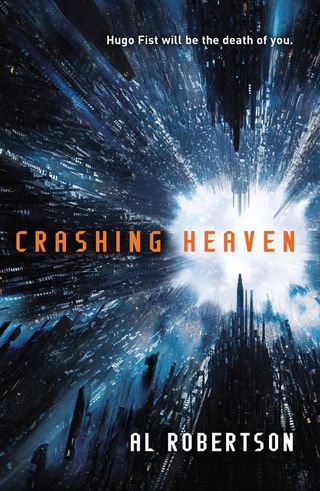Author Al Robertson has been taken in by the commercial side of science fiction
I love adverts in science fiction, because they can do so much. They can build worlds, subvert them and even destroy them.
Let’s look at world building first. Adverts can tell you a lot about a new science fiction world very quickly. Here’s one I love – a straight up info dump from the original Westworld (oh, and I’m taking film examples because ads are so visual and it’s great to watch a few).
Well, they may have been robots…
The first few minutes of Westworld is one long sales promo:
It does a great job of setting up the film’s locations – you’re very quickly introduced to Medieval World, Roman World and (of course) Wild West World.
It also does something a little subtler. It starts making you feel a little uneasy about these worlds, and the people who visit them. They’ve all been using technology to live out consequence-free fantasies of sex, violence and control.
Sign up to the SFX Newsletter
Get sneak previews, exclusive competitions and details of special events each month!
But – as viewers from the real world – we know that technologies fail and that fantasy, when over-indulged, has a habit of pushing back. And of course, we’re all naturally suspicious of such over-the-top positivity. So the advert subverts itself. It primes us to expect mayhem, which the film then delivers.
In fact, it builds the world of Westworld in two ways. It doesn’t just describe it – it hints at how it’s going to fail. That second point is crucial. Advertising isn’t just a very useful world-building tool. It’s a great world-critiquing one, too.
I’d buy that for a dollar
That kind of critique pervades the RoboCop movies, films that know exactly how advertising shows us what any society cares most about. They use that knowledge in a savagely satirical way. Here’s a collection of ads from all three of the original RoboCop films:
These ads skewer the world they show us. The Nukem board game and Magnavolt ads nail its core ethos – “get them before they get you”. The Sun Block 5000 spot highlights personal short-sightedness and thoughtless corporate greed. And the 6000 SUX’s Godzillatastic mayhem rebrands selfish personal indulgence as patriotic, principled consumption (“An American tradition – 8 MPG”).
And of course, like all the best satire, they’re not just attacking somewhere imaginary. They force us to reflect on our own world, too. How much does our own free market, heavily privatised, ecologically damaged paradise share with Robocop’s dystopia? How easily could these ads map into our own commercial breaks? It’s all rather too close for comfort…
What a brave corporate logo!
Finally, advertising is a technology of manipulation. Sometimes, the manipulation is entirely personal. Here’s an example from Serenity. This Fruity Oaty Bar ad contains a subliminal signal that forces Alliance runaway River Tam to reveal herself:
She watches it, switches to combat mode and goes on the rampage. Advertising’s power over the self comes to life, the bad guys hunting her get a heads up on her location and an entire bar’s worth of (more-or-less) innocent patrons gets beaten up.
Of course, River’s ad is a one shot weapon – it’s aimed at her and her only. There are less personal advertising apocalypses out there. John Carpenter created two of the best. This is possibly the most irritatingly catchy made-up ad ever created:
In the rather-underrated Halloween III: Season Of The Witch, it’s going to trigger all kinds of cod-pagan mayhem. Shards of Stonehenge, embedded in Silver Shamrock Halloween masks, will be activated by the ad, setting swarms of insects and snakes lose to kill lots of people and reinstate Samhain as a dark, brutal celebration of darkness. Oh, and there are evil androids too (as well as being rather under-rated, Halloween III is also rather crazy).
Anyway, for a more global – and more purely SFnal – take on the destructive force of advertising, there’s evil-ad classic They Live. Aliens have conquered the world! They’re reprogramming us all! Nobody’s really noticed! OBEY! CONSUME!
And then, our hero comes along, gets hold of the right pair of sunglasses and understands the truth:
It’s a lovely scene. Apart from anything else it’s a great comment on just how pervasive advertising is in our modern world.
Imagine if a political party or religion shouted its messages at us in the same way – we’d all be deeply worried about brainwashing. But giving so much public space to a bunch of highly creative people with a deep understanding of consumer psychology who want to sell us lots of stuff we may or may not actually need? That’s no problem at all…
Both movies are deeply suspicious of advertising, understanding it as a type of social control that benefits the vendor and harms the viewer. They don’t use advertising to critique society – they condemn it as the force that’s breaking it. Advertising becomes the Big Bad that has to be fought and defeated before it destroys us all.
So, that’s why I always watch out for advertising in science fiction. It’s great for world building, world critiquing and world-destroying. And now I’m off to watch some real world advertising. After looking at all these fictional ads, I’m very intrigued to see how some real ones are saying about our own version of reality…

Al Robertson's Crashing Heaven is available now.
SFX Magazine is the world's number one sci-fi, fantasy, and horror magazine published by Future PLC. Established in 1995, SFX Magazine prides itself on writing for its fans, welcoming geeks, collectors, and aficionados into its readership for over 25 years. Covering films, TV shows, books, comics, games, merch, and more, SFX Magazine is published every month. If you love it, chances are we do too and you'll find it in SFX.
Most Popular




